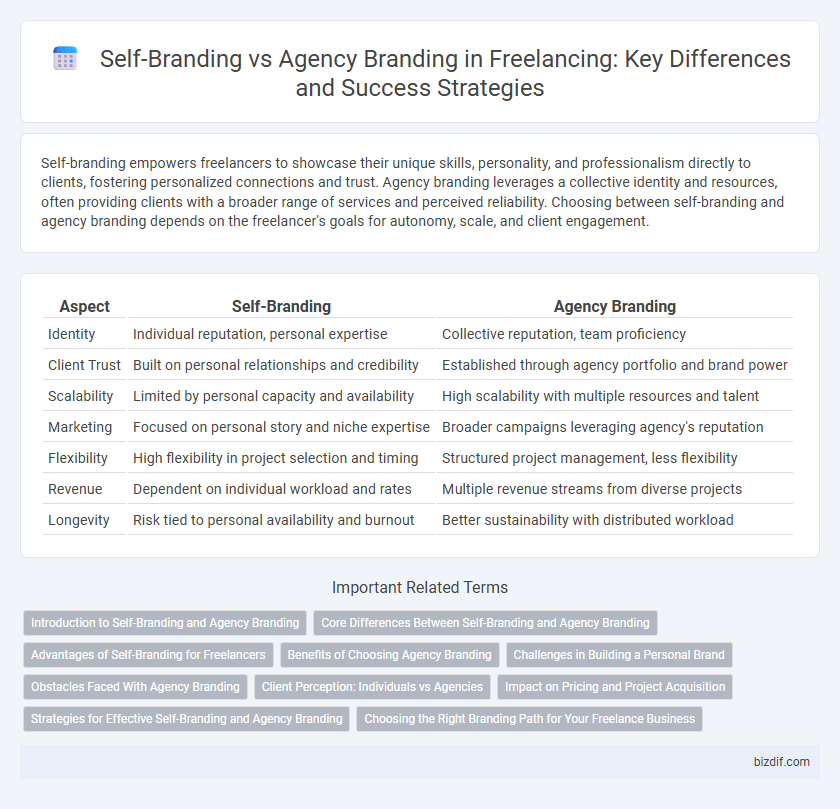Self-branding empowers freelancers to showcase their unique skills, personality, and professionalism directly to clients, fostering personalized connections and trust. Agency branding leverages a collective identity and resources, often providing clients with a broader range of services and perceived reliability. Choosing between self-branding and agency branding depends on the freelancer's goals for autonomy, scale, and client engagement.
Table of Comparison
| Aspect | Self-Branding | Agency Branding |
|---|---|---|
| Identity | Individual reputation, personal expertise | Collective reputation, team proficiency |
| Client Trust | Built on personal relationships and credibility | Established through agency portfolio and brand power |
| Scalability | Limited by personal capacity and availability | High scalability with multiple resources and talent |
| Marketing | Focused on personal story and niche expertise | Broader campaigns leveraging agency's reputation |
| Flexibility | High flexibility in project selection and timing | Structured project management, less flexibility |
| Revenue | Dependent on individual workload and rates | Multiple revenue streams from diverse projects |
| Longevity | Risk tied to personal availability and burnout | Better sustainability with distributed workload |
Introduction to Self-Branding and Agency Branding
Self-branding centers on individuals promoting their unique skills, expertise, and personality to attract clients, emphasizing personal reputation and direct client relationships. Agency branding represents a collective identity where a group offers diversified services under a unified brand, leveraging combined resources and broader market reach. Understanding the distinctions between self-branding and agency branding is crucial for freelancers deciding how to position themselves in competitive markets.
Core Differences Between Self-Branding and Agency Branding
Self-branding centers on an individual's unique skills, personality, and reputation, creating a personal connection with clients, whereas agency branding emphasizes a collective identity, offering a diverse range of services through a team. Self-branding allows for direct client interaction and more flexible project choices, while agency branding benefits from shared resources, scalability, and broader market reach. Understanding these core differences helps freelancers decide whether to build a personal brand or develop an agency brand to align with long-term business goals.
Advantages of Self-Branding for Freelancers
Self-branding allows freelancers to showcase their unique skills and personality, creating a distinctive market presence that attracts ideal clients. It fosters direct client relationships, enhancing trust and communication while enabling personalized service delivery tailored to individual client needs. Freelancers benefit from greater control over their reputation and flexibility in adapting their brand identity as they grow professionally.
Benefits of Choosing Agency Branding
Agency branding offers the advantage of collective expertise, providing clients with access to a diverse skill set and specialized services that solo freelancers may lack. This branding approach enhances credibility and trust through a unified, professional image, making it easier to attract larger, high-profile clients. Agencies typically have established workflows and resources, ensuring consistent quality, scalability, and reliable project delivery across multiple assignments.
Challenges in Building a Personal Brand
Building a personal brand as a freelancer involves overcoming challenges like establishing credibility, demonstrating expertise, and maintaining consistent visibility across digital platforms. Freelancers must invest significant time in content creation, network expansion, and client relationship management to differentiate themselves in competitive markets. Unlike agency branding, self-branding requires a strategic balance of authenticity and professionalism to foster trust and attract long-term clients.
Obstacles Faced With Agency Branding
Agency branding faces challenges such as diluted individual recognition, complex decision-making processes, and difficulty in establishing a unique market identity due to multiple stakeholders. The need for consistent messaging across diverse team members often leads to brand inconsistency and slower adaptation to market trends. Additionally, agencies struggle with maintaining client trust when individual contributors' reputations are overshadowed by the overall brand.
Client Perception: Individuals vs Agencies
Clients often perceive individual freelancers as more personal, flexible, and directly accountable compared to agencies. Agencies typically evoke a sense of reliability, scalability, and access to diverse expertise due to their collective resources and team structure. The choice between self-branding and agency branding influences client trust, expectations, and project scope based on perceived professionalism and service capacity.
Impact on Pricing and Project Acquisition
Self-branding allows freelancers to set premium pricing by showcasing unique skills and personalized client experiences, often attracting higher-value projects through direct relationships. Agency branding leverages collective reputation and resources, enabling competitive pricing and access to larger, diversified projects via established networks. The choice impacts project acquisition strategies, with freelancers relying on individual credibility and agencies benefiting from broader market presence.
Strategies for Effective Self-Branding and Agency Branding
Effective self-branding in freelancing requires showcasing a unique value proposition through consistent personal storytelling, professional portfolios, and active engagement on social media platforms like LinkedIn and Behance. Agency branding strategy prioritizes creating a cohesive brand identity that reflects collective expertise, client success stories, and a unified visual style across multiple channels such as websites, newsletters, and industry events. Employing targeted content marketing and leveraging client testimonials enhance credibility and attract ideal clients in both self-branding and agency branding approaches.
Choosing the Right Branding Path for Your Freelance Business
Selecting the ideal branding strategy significantly impacts a freelance business's growth and client acquisition. Self-branding builds a personal connection by highlighting individual expertise and unique style, fostering trust and direct client relationships. In contrast, agency branding leverages a collective identity, promoting scalability and diverse skill sets, ideal for freelancers aiming to expand their services and team capacity.
Self-Branding vs Agency Branding Infographic

 bizdif.com
bizdif.com